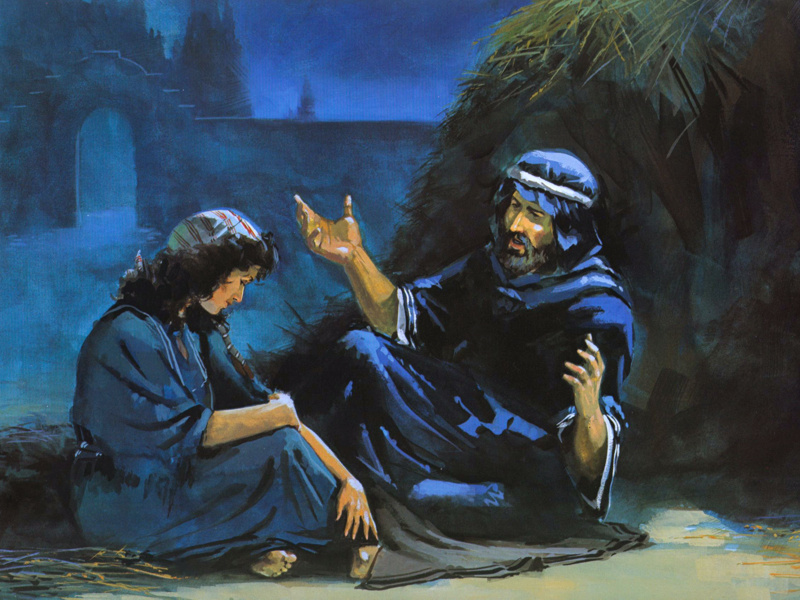
Throughout November we’re taking an in-depth look at Ruth, the little book that helped pave the way for God’s Messiah to come into the world.
The greatest tragedy is not that life comes to an end.
It’s that fear makes us wait so long to really live.
We may think that bad theology is what keeps people away from God. Actually, it’s more often the terror of letting go of “my real life” – my everyday existence which is known and predictable and under my control. But surrendering my need to be in control is the only way I will ever find out if God is really God.
Ruth confronts her fears and decides to pursue an extraordinary, faith-based gamble. She risks her reputation and her well-being by approaching Boaz in the middle of the night at the threshing floor. Here’s what happens next:
When Boaz had finished eating and drinking and was in good spirits, he went over to lie down at the far end of the grain pile. Ruth approached quietly, uncovered his feet and lay down. In the middle of the night something startled the man, and he turned and discovered a woman lying at his feet. “Who are you?” he asked. “I am your servant Ruth,” she said. “Spread the corner of your garment over me, since you are a kinsman-redeemer” (Ruth 3:7-9).
This is the big moment. In the pitch darkness of the threshing floor, her heart beating fast, she is symbolically asking Boaz, “Will you marry me?” It’s not as if she can say, “Hey, I’m heading down to the mall tomorrow and wondered if maybe you’d like to go and check out some wedding bands. Every kiss begins with Kay, right?”
Boaz immediately recognizes what’s at stake here. He grasps the enormity of the risk Ruth is taking. Instead of blasting her, he honors her. He seems immediately won over by her sheer chutzpah:
“The Lord bless you, my daughter,” he replied. “This kindness is greater than that which you showed earlier: You have not run after the younger men, whether rich or poor. And now, my daughter, don’t be afraid. I will do for you all you ask. All my fellow townsmen know that you are a woman of noble character” (Ruth 3:10-11).
Here we arrive at a famously awkward moment in the history of interpretation.
Different cultures cherish different euphemisms for human body parts. It’s well known that one of the ancient Hebrew euphemisms for male genitalia was “feet.” When Naomi instructed Ruth to lie down and uncover Boaz’s feet, was she advising her to throw caution to the wind in their relationship? This is where beginning Bible students sometimes say, “You know, this book is turning out to be a lot more interesting than I thought.”
But there are compelling reasons for affirming that there’s not a hint of impropriety in this scene.
Consider Boaz’s last sentence: “All my fellow townsmen know that you are a woman of character.” Ruth is regarded as a person of unimpeachable honor. In verse 14 he urges her not to talk up the fact that she, a woman, actually visited the threshing floor. That’s not a coverup of misbehavior, but a safeguarding of her reputation. In an “honor culture,” even to this day, the value of one’s reputation exceeds everything else. Once sullied, it is virtually impossible to restore.
In a statement that is often mis-attributed to Sigmund Freud, “Sometimes a cigar is just a cigar.” In Ruth chapter three, there are good reasons for believing that Boaz’s feet are just Boaz’s feet.
Commentators agree, however, that there is a Hebrew euphemism at the center of this text.
Ruth literally pulls back Boaz’s garment, uncovering his feet, as a way to invite him figuratively to spread that same cloak back over her. This acted-out parable reflects an idea that was deeply planted in biblical culture. Ruth is saying, “Will you cover me with the protection of your faithfulness and love?”
Here we recall that Boaz had told Ruth, on the day they first met, that he hoped the God of Israel would cover her with his wings. Now Ruth is saying, “Boaz, will you be the answer to your own prayer? Will you become God’s means of taking care of me?”
He responds tenderly:
“Bring me the shawl you are wearing and hold it out.” When she did so, he poured into it six measures of barley and put it on her… When Ruth came to her mother-in-law, Naomi asked, “How did it go, my daughter?” Then she told her everything Boaz had done for her and added, “He gave me these six measures of barley, saying, ‘Don’t go back to your mother-in-law empty-handed’” (Ruth 3:15-17).
Where have we heard that word “empty” before? Back in chapter one, verse 21, Naomi had moaned as she returned to Bethlehem, “I went away full, but the Lord has brought me back empty.” Now God is addressing her deepest needs. He is re-filing her life with blessing.
It seems that we’re headed for one whale of a happy ending.
But as is so often true, a major obstacle still looms.
The final challenge for Ruth and Naomi will come into view tomorrow.
